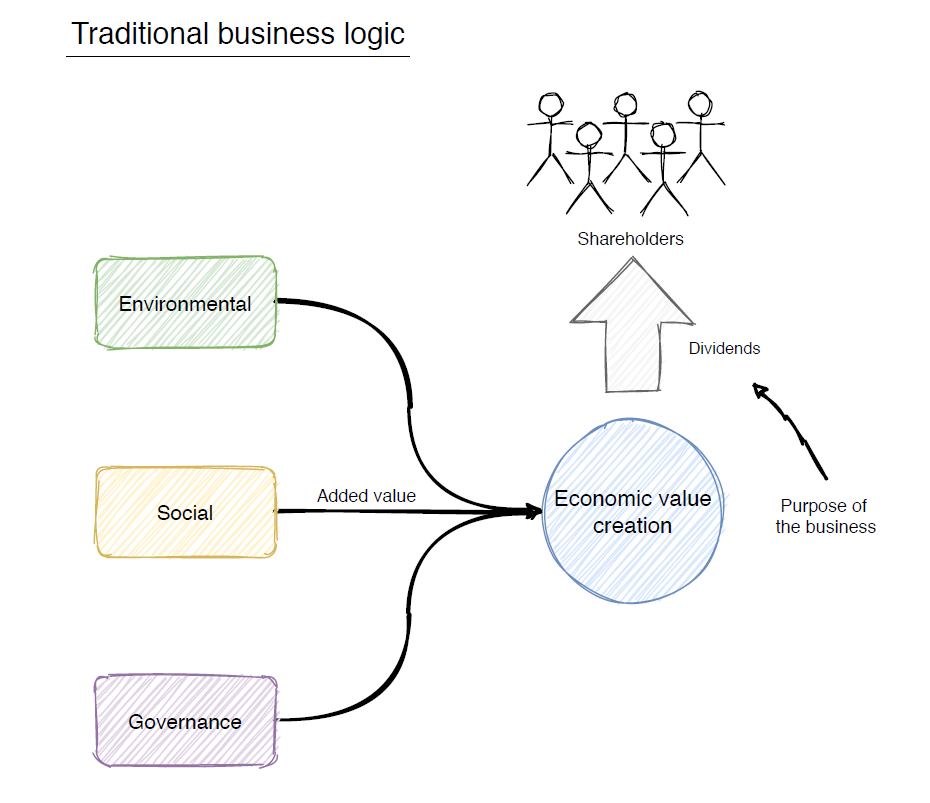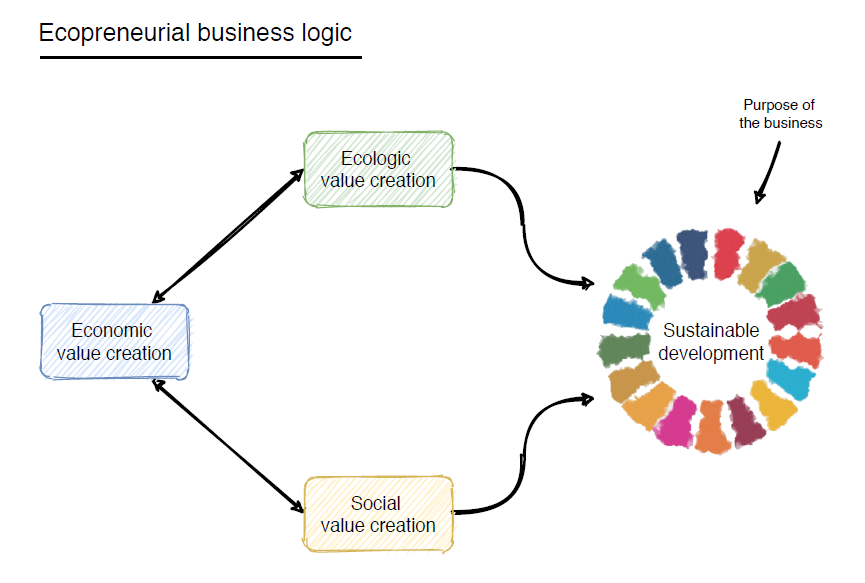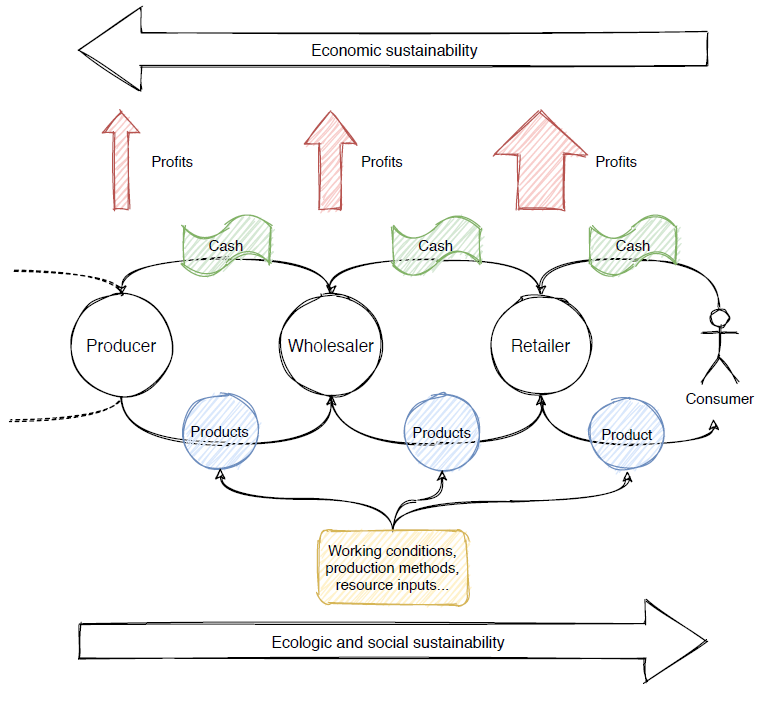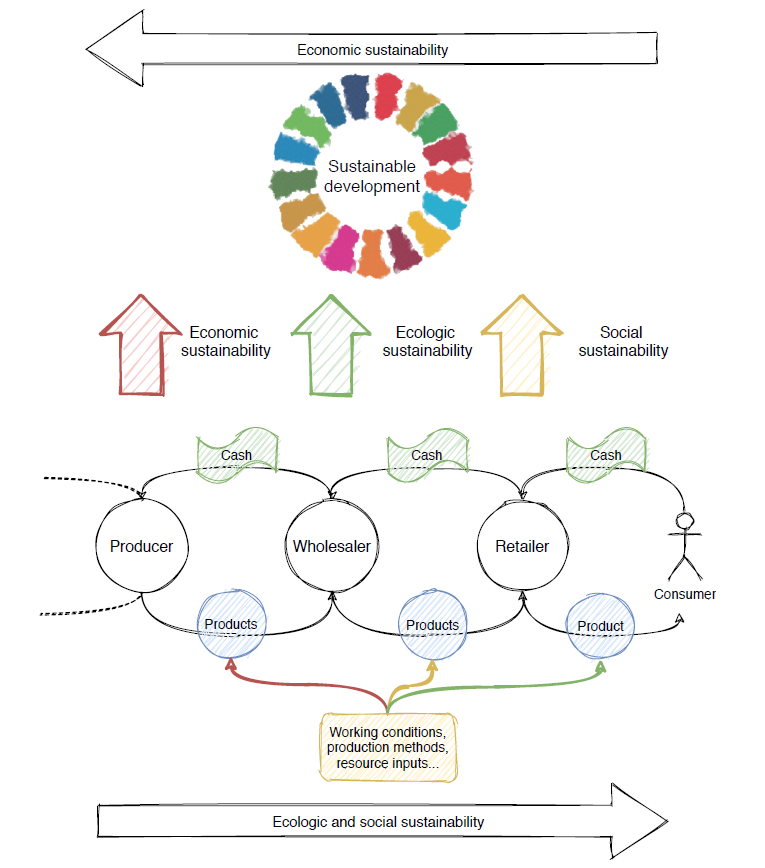Re-Imagining the economy
The current economic system has a straightforward logic behind it: a company’s purpose is to produce profits. Even though we have seen more scrutiny in how these profits are created and companies engage in CSR (corporate social responsibility) and ESG (environmental, social and governance) measures, the rationale is very much the same. Make profits but make them in a better way. This can be seen in the vast amount of literature that equates organisational performance with financial performance. There are many studies now that show for example the benefits of ESG investments and by benefits they mean that ESG investments hold the potential to financially outperform non-ESG investments over the long run. Further much has been written about potential win-win scenarios in sustainability, like increasing resource efficiency which improves the ecologic sustainability by reducing needed inputs and carbon emissions whilst lowering costs and thus improving the economic performance of the company. These opportunities are clearly beneficial and should be seized wherever possible. However, seeing that this idea has been around since the 2000s and we are still seeing increasing greenhouse gas emissions begs to ask the question whether they are enough to tackle climate change. The rationale clearly is still the same. We engage with sustainability only when it increases profitability.

The problem with this is that any measures companies take to improve their sustainability, have to be justified by an increased return on investment, as profit is the still the main goal of the company. Even measures that don’t show a directly measurable return on investment will need to add value to the company for example through improved brand reputation. Again, value here is understood as economic value and ultimately profits that can be paid out to shareholders. So even though companies try to do better in terms of how they create profits, Milton Friedman’s assertion that a business’s only responsibility is to create shareholder profits persists. What follows from this is that any sustainability measures that don’t create economic value, are seen as a trade-off for the company because they detract from organisational performance. Companies will thus try to avoid taking these measures or portray their engagement with them as a sign of goodwill. We have seen this time and time again, for example when companies refuse to improve working conditions unless there is public outcry that damages the brand. Our current economic system is thus a one-way street where the majority of value we create is translated into profits, to be extracted by the shareholders.
Ecopreneurial business logic
An alternative to the existing economic system can be derived from the reasoning behind ecopreneurs’ business practices. The research has found that ecopreneurs don’t simply create ventures that aim to do better on ecologic and social sustainability issues. Ecopreneurs have radically changed the goal definition of their ventures. Instead of profit, the ecopreneurial venture’s goal is sustainable development and organisational performance is equated to the venture’s contribution to it. This is not to say ecopreneurs don’t want to and need to make a profit (economic growth after all is one of the SDGs), but profit is no longer an end its own right. Instead in the ecopreneurial logic, profit has become a means to drive sustainable development. What follows from this is:
In an ecopreneurial venture, profits don’t contribute to success unless they are translated into activities that drive to sustainable development.
Profit maximising here has been replaced by maximising the contributions to sustainable development. In this logic we don’t say profits should not be made, but we raise the question: What and who are we making them for? Going back to the SDGs economic growth for example does not stand on its own but is only an SDG in combination with decent work. So while it is desirable for a venture to capture economic value, we need to consider how this value is created and that it is fairly distributed to the people creating it.

This logic then provides a justification for sustainability efforts that go beyond win-win scenarios. In the ecopreneurial business practices we can see that ecopreneurs for example limit their prices to make sustainable food accessible to low income households, pay their suppliers above the market price to enable their sustainability or pay their employees the highest possible wages. These measures increase the ecologic and social performance of their ventures whilst reducing their profits. In the traditional logic of profit maximising this would be considered detracting from organisational performance (financial performance). In the ecopreneurial logic however these measures are not trade-offs. Instead they directly contribute to organisational performance by contributing to sustainable development.
Changing our understanding of organisational performance in this way, not only impacts how ventures act internally, but also how they act amongst each other in their supply chains and the competitive landscape.
Ecopreneurial supply chains
A venture’s sustainability cannot be assessed without its supply chain, because the sustainability of suppliers’ practices has a direct impact on the sustainability of the products that a venture produces and sells. Further the sustainability of the distribution methods affects a product’s sustainability when it arrives at the consumer. The research suggests that economic sustainability flows from buyers to suppliers through the money that is paid for the products. The ecologic and social performance appear to flow downstream from the suppliers to the buyers because they are attached to goods and services.

Consequently, by paying higher prices a buyer can transfer some of their economic performance to their suppliers. This enables the suppliers to engage in more activities that increase ecologic and social sustainably. The increased sustainability of the supplier then positively impacts the buyers own sustainability, because the products they sell have improved sustainability credentials.
If we consider that profit does not impact a venture’s organisational performance unless it is translated into activities that contribute to sustainable development, we can see that enabling suppliers to become more sustainable through collaboration and sharing of economic value will increase a venture’s performance as a result of the supply chain’s increased contribution to sustainable development. This means:
Fairly distributing economic value throughout the supply chain, increases the potential to contribute to sustainable development at each stage of the supply chain. Consequently, each venture’s performance is increased as the overall sustainable performance of the supply chain increases.
Supply chains that follow the ecopreneurial business logic are thus characterised by high levels of collaboration, joint efforts of developing sustainability and a fair distribution of the economic value that is produced. Practices such as squeezing suppliers to capture excess economic value (profit) in a single venture, disappear because they detract from the supply chain’s sustainability and the ecopreneurial venture’s performance.

Competition and growth
Replacing profit with sustainable development as organisational goals also impacts the competitive behaviour of ecopreneurial ventures outside of their supply chain. The research has shown that ecopreneurs share their knowledge, newly developed sustainable techniques and resources with other mission driven ventures, which traditionally would be considered competition. Through this ecopreneurs are effectively lowering entry barriers and encourage other ventures, who share their mission, to enter the market.
…ecopreneurs are indifferent to which venture captures and translates economic value into ecologic and social value, as long as they remain economically viable…
In the traditional approach this behaviour would be detrimental to organisational performance measured in profit. In the ecopreneurial business logic however this behaviour increases the overall contribution to sustainable development in the market and therefor increases organisational performance. Because profit has no impact on an ecopreneurial venture’s success unless it is translated into activities that contribute to sustainable development, ecopreneurs are indifferent to which venture captures and translates economic value into ecologic and social value, as long as they remain economically viable. Ecopreneurs therefore aim to grow their business to a point where they are competitive and break-even, but within the constraints of their own social and ecologic sustainability. When the growth of one ecopreneurial venture becomes unsustainable, ecopreneurs can grow the impact of their mission by supporting ventures in other regions to start-up and deliver their mission.
Utopia
In a utopian world where every business follows the ecopreneurial business logic the economy would look very different:
- Every business would maximise their contribution to sustainable development and measure success in how much they manage to do so.
- Companies prioritise ecologic and social well-being over shareholder profits.
- Supply chains become collaborative networks of value creation in which the economic value that is captured is shared fairly between all network members.
- Businesses would encourage others to replicate their mission and lower entry barriers to a point where a competition and cooperation maximise sustainable development and each venture breaks even.
Interestingly the idea of a market in which businesses do not capture profits but only cover their cost is a something that economists have known of for a long time. They like to call it perfect competition. While the underlying logic of perfect competition is different, it seems that zero-profits are an important feature of a functioning market; be it in neoclassical economics or sustainable development.
To understand how this economy can be put into practice read Ecopreneurship: Business practices for a sustainable future.